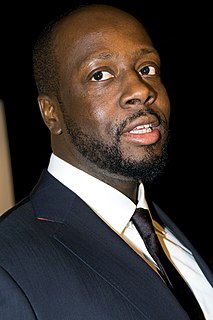A Quote by Criss Jami
One may not always know his purpose until his only option is to monopolize in what he truly excels at. He grows weary of hearing the answer 'no' time and time again, so he turns to and cultivates, monopolizes in his one talent which others cannot possibly subdue. Then, beyond the crowds of criticism and rejection, the right people recognize his talent - among them he finds his stage.
Related Quotes
The master in the art of living makes little distinction between his work and his play, his labor and his leisure, his mind and his body, his information and his recreation, his love and his religion. He hardly knows which is which. He simply pursues his vision of excellence at whatever he does, leaving others to decide whether he is working or playing. To him he's always doing both.
Man never ceases to seek knowledge about the objects of his experiences, to understand their meaning for his existence and to react to them according to his understanding. Finally, out of the sum total of the meanings that he has deduced from his contacts with numerous single objects of his environment there grows a unified view of the world into which he finds himself "thrown" (to use an existentialist term again) and this view is of the third order.
Let no one imagine that he will lose anything of human dignity by this voluntary sell-out of his all to his God. He does not by this degrade himself as a man; rather he finds his right place of high honor as one made in the image of his Creator. His deep disgrace lay in his moral derangement, his unnatural usurpation of the place of God. His honor will be proved by restoring again that stolen throne. In exalting God over all, he finds his own highest honor upheld.
The essential facts are known. We know of the weapons in Saddam's possession: chemical, biological, and nuclear in time. We know of his unequaled willingness to use them. We know his history. His invasions of his neighbors. His dreams of achieving hegemonic control over the Arab world. His record of anti-American rage. His willingness to terrorize, to slaughter, to suppress his own people and others. We need not stretch to imagine nightmare scenarios in which Saddam makes common cause with the terrorists who want to kill us Americans and destroy our way of life.
When a lion stalks a herd, he sneaks in close, lies down, and surveys them to choose his victim. He takes his time. The deer or buffalo have no idea he’s near. He finds his prey and then he explodes from his hiding place and grabs it. Even if another, perfectly serviceable animal ends up within his reach, he isn’t going to alter his course. He has chosen, and he would rather go hungry than change his mind.
It has always been my belief that the true artist, like the true scientist, is a researcher using materials and techniques to dig into the truth and meaning of the world in which he himself lives; and what he creates, or better perhaps, brings back, are the objective results of his explorations. The measure of his talent--of his genius, if you will--is the richness he finds in such a life's voyage of discovery and the effectiveness with which he is able to embody it through his chosen medium.
The defining character of Steve Jobs isn't his genius, it isn't his talent, it isn't his success. It's his love. That's why crowds came to see him. You could feel that. It sounds ridiculous to talk about love when you are making a gadget. But Steve loved his work, he loved the products he produced, and it was palpable. He communicated that love through bits of steel and plastic.
Here's a strange fact: murder a man, and you feel responsible for his life - ''possessive'', even. You know more about him than his father and mother; they knew his fetus, but you know his corpse. Only you can complete the story of his life, only you know why his body has to be pushed into the fire before its time, and why his toes curl up and fight for another hour on earth.







































